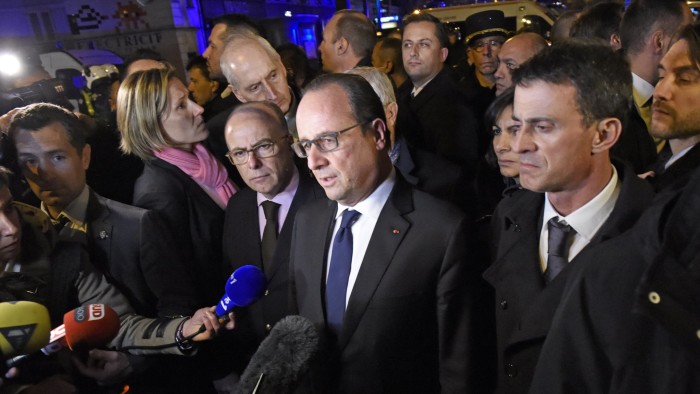Paris attacks: France stands at a crossroads

Roula Khalaf, Editor of the FT, selects her favourite stories in this weekly newsletter.
On this dreadful morning after, France is at an equipoise between two sharply contrasting options. One is to withdraw into a less open, more inward-looking society while conducting a harsher, Russian-style military campaign in Syria. The other is to preserve the country’s role as an open European society exercising strategic prudence in the Middle East.
The path that prevails will be important in shaping the course of the EU as a whole. It will also determine whether or not the jihadis won or lost in Paris on Friday November 13.
The victory or the defeat of terrorism is not measured by the number of victims. What defines the outcome is the response of the targeted society. This can range from London’s impressive “keep calm and carry on” reaction to the 7/7 attacks of 2005; to the Spanish government’s dysfunctional denial of jihadi responsibility after the Madrid bombings of 2004; by way of Russian President Vladimir Putin’s promise to “knock the Chechens off in the outhouse” or America’s Iraq disaster and the Patriot Act.
France now stands at the same crossroads, with the crucial decisions playing themselves out within the next hours and days domestically and abroad. In France, there will be the inevitable cries for tougher, ad hoc legislation, made shriller by the rise of the National Front. This has been skilfully pre-empted by President François Hollande’s announcement of a state of emergency, making the point that there are more than enough resources in the existing legislative and regulatory arsenal.
The announcement by the governing Socialists, the mainstream right and the National Front that they are suspending the campaign for next month’s regional elections, is a pointer in the right direction.
Down the road, though, anti-Islamic sentiment and xenophobia will rise further, hardening France’s refusal to open its doors to the stream of refugees from Syria. The National Front will benefit while the mainstream right’s centre of gravity will shift correspondingly. At a time when the refugee crisis is throwing into question the future of open borders in the EU, this could deal a fatal blow to finding a European-wide solution to the problems posed by population movement.
The French will have to sharply ramp up their “too little, too late” efforts at bolstering their security services. The DGSI, the French intelligence agency that is the functional equivalent of Britain’s MI5, was set up less than two years ago and, despite substantial new funding, its financial and human resources are clearly insufficient.
The scale and the complexity of the November 13 attacks, with their multiple targets and modi operandi, speak of a threat level that is rising faster than the state’s ability to cope with it. To make matters worse, survivors have told how they were confronted by French-speaking terrorists rather than outsiders unfamiliar with the areas they were targeting.
Because the bolstering of domestic security will take time, the temptation will be great to follow the American and Russian road of apparently decisive action in the Middle East — going to the source of the problem.
This has great appeal. Bombing operations and special-forces raids make great YouTube and television, demonstrating graphically that our leaders are in control and doing something apparently worthwhile. They also have an easy-to-sell common-sense quality. Since Isis is at the heart of the matter, going to its territory in Syria and Iraq is logical.
The logic is readily taken one step further: since the enemy of my enemy is my friend, and since President Bashar al-Assad of Syria is the enemy of Isis, Bashar al-Assad is my friend. This line was part of the French conversation before the November 13 attack. It may well take centre stage.
Unfortunately, what sounds simple and logical does not necessarily make good policy in a complex situation. Supporting Mr Assad and Hizbollah, and their Iranian allies, will only further alienate the majority Sunni population of Syria, fuelling recruitment for jihadi organisations. Russia’s bombing of Sunni groups unaffiliated with Isis makes matters worse. This was well understood by the French government up to now. It remains to be seen whether France will be able to resist the siren call of “all with Assad against Isis”.
Whatever basic decision France makes, it must be borne in mind that it will be taken against the backdrop of probable further attacks. The number of operatives involved in this atrocity — and its sophistication, along with its apparent roots in France itself — leave little hope that this is a one-off.
The societal and policy response will have to take that prospect into account.
The writer is special adviser at the Paris-based Fondation pour la Recherche Stratégique
Comments